

How can we then, effectively manage it? Let's find out! 'Stress as a Psychological Process' You may also try out this simple Workplace Stress Survey by the AIS to test out your stress score. Work-related burnout is real in Singapore. SINGAPORE: One day at work, Ms Jamuna Raj was striking off “to-dos” from a neat hand-written list, thinking she had a lid on all her tasks at work.
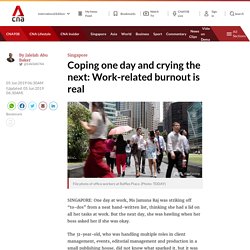
But the next day, she was bawling when her boss asked her if she was okay. Rates of Employee Burnout in Singapore Among the Highest in the World. A survey released by Cigna in March 2019, shows that Singaporeans are among the most stressed at work globally, with almost one in eight considering their stress unmanageable.
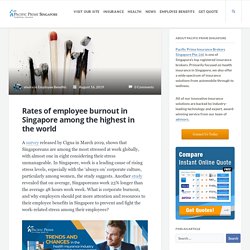
In Singapore, work is a leading cause of rising stress levels, especially with the ‘always on’ corporate culture, particularly among women, the study suggests. Another study revealed that on average, Singaporeans work 23% longer than the average 48 hours work week. What is corporate burnout, and why employers should put more attention and resources to their employee benefits in Singapore to prevent and fight the work-related stress among their employees? What is, and what causes employee burnout? In May 2019, the WHO officially started to recognize burnout as an occupational phenomenon which may require care. Feelings of energy depletion or exhaustion;Increased mental distance from one’s job, or feelings of negativism or cynicism related to one’s job; andReduced professional efficacy.”
The cost of corporate burnout. TODAYonline—The lack of stress coping programmes for working adults. SINGAPORE — Singaporeans are not only sleep deprived, but they are also among the most stressed at work globally, according to a survey by health service company Cigna released on Tuesday (Mar 26).

Nearly 92 per cent of Singaporeans surveyed were stressed from work, which was higher than the global average of 84 per cent. Of this group, 13 per cent said that the stress they faced was unmanageable. Singaporeans’ physical wellness index also dipped by 4.4 percentage points from last year, which the survey attributed to an increase in sleepless nights. Of the 23 markets surveyed, Singapore had the fifth lowest wellness index, which was measured across five key indices — family, financial, physical, social and work. Singapore fell by a place from last year as its wellness index went down by 1.7 points to 57.8. The survey collated about 13,200 responses from over 24 countries, with a sample of 502 respondents in Singapore. Read also “Vulnerability will make it seem that you are not as competent.
3 types of Stress and health hazards. Stress is a feeling that people have when they are struggling to cope with challenges related to finances, work, relationships, environment, and other situations.
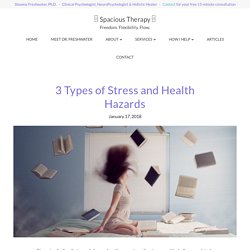
Moreover, stress is felt when an individual perceives a real or imagined challenge or threat to a their well-being. People often use the word stress interchangeably with anxiety, feeling anxious, fearful, nervous, overwhelmed, panic, or stressed-out. Stress is the body’s natural defense against real or imagined danger. It flushes the body with hormones to prepare systems to evade or confront danger. This is known as the “fight-or-flight or freeze” response. The body is an intelligent operating system, but the body can not determine the difference between life threatening external threat from imagined or perceived non-life threatening stressors. Top 5 Triggers for stress in the workplace. Good Stress, Bad Stress? Feeling stressed can feel perfectly normal, especially during exam time.
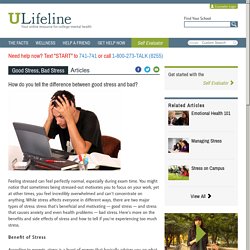
You might notice that sometimes being stressed-out motivates you to focus on your work, yet at other times, you feel incredibly overwhelmed and can’t concentrate on anything. The Difference Between Worry, Stress and Anxiety. In prehistoric times, stress was a natural response to a threat, like hearing a predator in the bushes.
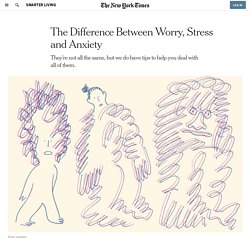
Today, it still prompts a behavioral response, firing up your limbic system and releasing adrenaline and cortisol, which help activate your brain and body to deal with the threat, Dr. Greenberg explained. Symptoms of stress include a rapid heart rate, clammy palms and shallow breath. Stress might feel good at first, as the adrenaline and cortisol flood your body, Dr. Marques said. Chronic stress, on the other hand, is when your body stays in this fight-or-flight mode continuously (usually because the situation doesn’t resolve, as with financial stressors or a challenging boss).
Get exercise. Remember: Stress is a biological response that is a normal part of our lives. If stress and worry are the symptoms, anxiety is the culmination. Warning signs of how stress can affect us. Coping with stress at work? Everyone who has ever held a job has, at some point, felt the pressure of work-related stress.
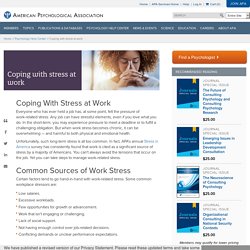
Any job can have stressful elements, even if you love what you do. In the short-term, you may experience pressure to meet a deadline or to fulfill a challenging obligation. But when work stress becomes chronic, it can be overwhelming — and harmful to both physical and emotional health. Stress Management Techniques. By Saul McLeod, published 2015 Stress arises when individuals perceive a discrepancy between the physical or psychological demands of a situation and the resources of his or her biological, psychological or social systems (Sarafino, 2012).
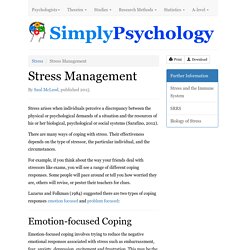
There are many ways of coping with stress. Their effectiveness depends on the type of stressor, the particular individual, and the circumstances. For example, if you think about the way your friends deal with stressors like exams, you will see a range of different coping responses. Some people will pace around or tell you how worried they are, others will revise, or pester their teachers for clues. Lazarus and Folkman (1984) suggested there are two types of coping responses emotion focused and problem focused: Emotion-focused Coping. 'Rage room' in Singapore offers destructive solution for stress. Simple yet effective ways to manage your stress levels. Try out some of these stress relieving games!
And if all else fails — remember, it is perfectly okay to seek professional help! Singapore Mental Health Support (MHS) Hotline. Troubled?
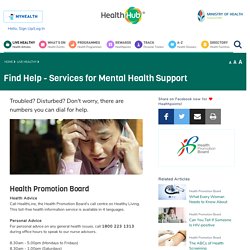
Disturbed? Don't worry, there are numbers you can dial for help. <div class="ExternalClass2DBED10DA37943309B9B889EA6E49BAC"><h2>Health Promotion Board</h2><div><strong>Health Advice</strong></div><div>Call HealthLine, the Health Promotion Board's call centre on Healthy Living. This toll-free health information service is available in 4 languages. </div><div></div><div><strong>Personal Advice</strong></div><div>For personal advice on any general health issues, call <strong>1800 223 1313</strong> during office hours to speak to our nurse advisors.